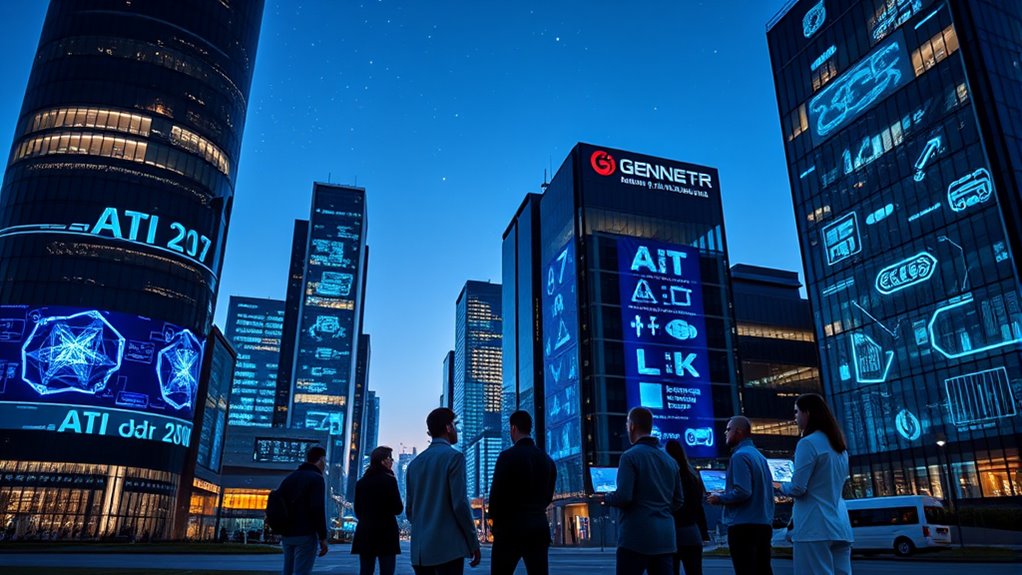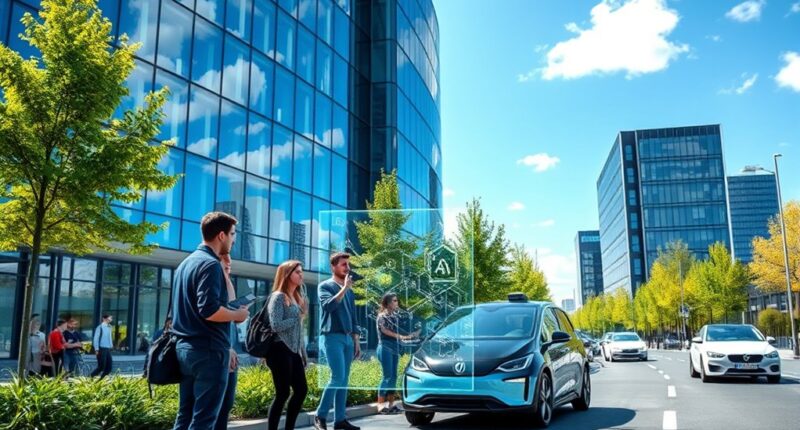Germany is executing a bold AI expansion plan that will reshape its tech landscape through nearly €5 billion in investments by 2025, focusing on infrastructure, startups, and ethical innovation. The country aims to build AI excellence centers, boost computing power, and support over 100 new AI professorships. This strategic push targets key sectors like healthcare and mobility. To learn how this transformation unfolds and impacts the future, continue exploring the full scope of Germany’s ambitious AI initiatives.
Key Takeaways
- Germany is investing nearly €5 billion by 2025 to boost AI development, infrastructure, and research talent.
- The country aims to expand data sovereignty and computational power through projects like GAIA-X and HPC centers.
- Focus on ethical AI and public engagement ensures trustworthy technology aligned with societal values.
- The growing startup ecosystem, supported by government programs, accelerates AI innovation and market deployment.
- Sector-specific initiatives in healthcare, climate, and mobility drive AI adoption across key industries.

Germany is making a bold move to strengthen its position in artificial intelligence by launching an ambitious expansion plan. Since 2018, the government’s AI strategy has evolved, focusing on boosting competitiveness, serving the public good, and embedding ethics into AI development. You’ll find that they’ve committed nearly €5 billion in public funding by 2025, including a €2 billion stimulus top-up, with annual budgets averaging €500 million in earlier phases. These investments aim to establish at least a dozen AI competence centers, creating hubs that connect academia, industry, and public agencies to foster collaboration and innovation. The federal government also supports over 100 new AI professorships, encouraging universities to develop expertise, while promoting digital upgrades for small and medium-sized enterprises (SMEs). Infrastructure projects like GAIA-X and national high-performance computing (HPC) centers form a core part of this strategy, ensuring data sovereignty and computational power for advanced AI research. Creative Halloween decoration ideas can also inspire innovative approaches in tech, as design thinking is essential for both fields.
Germany’s AI strategy invests nearly €5 billion to foster innovation, ethics, and collaboration across academia, industry, and public sectors.
You’ll notice that the plan emphasizes “ethics by design,” meaning AI systems should be trustworthy from the outset, with continuous public dialogue ensuring transparency and societal acceptance. As Germany pushes forward, infrastructure expansion remains a key priority, although challenges persist. The country aims to increase computing capacity to 3.7 gigawatts by 2030, a 50% rise, but industry demand could push needs as high as 12 gigawatts—three to five times current projections. Compared to the U.S., which boasts 20 times Germany’s computing power and faster growth, Germany’s infrastructure lags behind. Deloitte warns of a potential 50% capacity gap by 2030 if investments don’t accelerate. To address this, efforts include expanding the Gauss Centre for Supercomputing towards exascale capabilities and establishing the National Supercomputing Centre (NHR), emphasizing energy efficiency alongside raw power. These initiatives aim to balance cutting-edge performance with sustainability, considering energy consumption equivalent to multiple nuclear reactors.
On the startup front, your ecosystem is thriving. As of 2025, around 935 active startups are shaping the AI landscape—a 36% annual growth rate driven by rising investor confidence and broadening application demands. Government programs such as the EXIST initiative and the Industrial Collective Research scheme support early-stage ventures and collaborative projects that bridge research and market needs. Policy measures like the Tech Growth Fund provide venture debt to help startups scale faster, especially within top research domains. The government’s efforts have also prioritized fostering innovation ecosystems to ensure sustainable growth. Germany’s updated AI strategy targets key sectors like healthcare, climate, aerospace, and mobility. Dedicated pilot projects and innovation programs accelerate AI adoption in these areas, while regulatory sandboxes and digital test beds allow real-world experimentation. These measures facilitate smoother transitions from prototypes to deployment, aligning innovation with sustainability and public service goals. Overall, Germany’s bold AI expansion plan is reshaping its tech landscape, positioning the country as a competitive, ethical, and innovative player in the global AI arena.
Frequently Asked Questions
How Will AI Impact Germany’s Existing Industries Long-Term?
AI will markedly transform Germany’s industries long-term by boosting productivity and fostering innovation. You’ll see automation streamline routine tasks, enabling your business to focus on strategic growth. AI’s ability to support complex decision-making and improve quality will strengthen your competitiveness. As AI adoption expands, especially in manufacturing and industrial sectors, you’ll benefit from increased efficiency, new market opportunities, and technological advancements that help sustain Germany’s industrial leadership.
What Are the Ethical Considerations of Germany’s AI Expansion?
Think of Germany’s AI expansion as a responsible steward guiding a mighty ship. You’re tasked with ensuring ethical considerations like data privacy, fairness, and transparency stay at the forefront. You must balance innovation with safeguarding human autonomy, avoiding bias, and fostering public trust. By adhering to strict EU and national frameworks, you help create trustworthy AI that benefits society without compromising ethical standards or individual rights.
How Will AI Development Affect Employment in Germany?
AI development will lead to both job cuts and new opportunities in Germany. You’ll see some sectors, especially industrial and trade, experience layoffs, averaging around 8% per company. However, tech and AI-related roles will grow, creating demand for new skills like prompt engineering. Younger workers benefit more from AI, but you’ll need reskilling initiatives to help everyone adapt. Overall, AI reshapes employment by replacing routine tasks and enabling innovative roles.
What Collaborations Are Forming Between German and International AI Firms?
Are you ready to see how German and international AI firms are shaping the future together? You’ll find collaborations like OpenAI partnering with SAP and Microsoft for secure, sovereign AI in the public sector, while German startups team up with global giants like NVIDIA and Hitachi. These alliances boost innovation, fund R&D, and help Germany stay competitive, ensuring a vibrant, interconnected AI ecosystem that benefits everyone involved.
How Is Germany Ensuring AI Safety and Regulation?
You’re ensuring AI safety and regulation in Germany by following the EU AI Act directly, which sets strict rules for high-risk systems. You’ll need to register these systems, maintain transparency, and conduct ongoing assessments. The Federal Network Agency acts as your central authority for compliance. Additionally, sector-specific laws and the revised Product Liability Directive reinforce safety standards, so you stay within legal boundaries while promoting responsible AI development.
Conclusion
As you watch Germany’s AI ambitions unfold, it’s like witnessing a young sapling grow into a mighty oak, shaping the future of tech. Remember, just last year, their investment surged by 50%, fueling innovation across industries. This bold expansion isn’t just about technology; it’s about forging a resilient, forward-thinking nation. Keep an eye on Germany—you’re witnessing a renaissance that could redefine what’s possible in the digital age.









